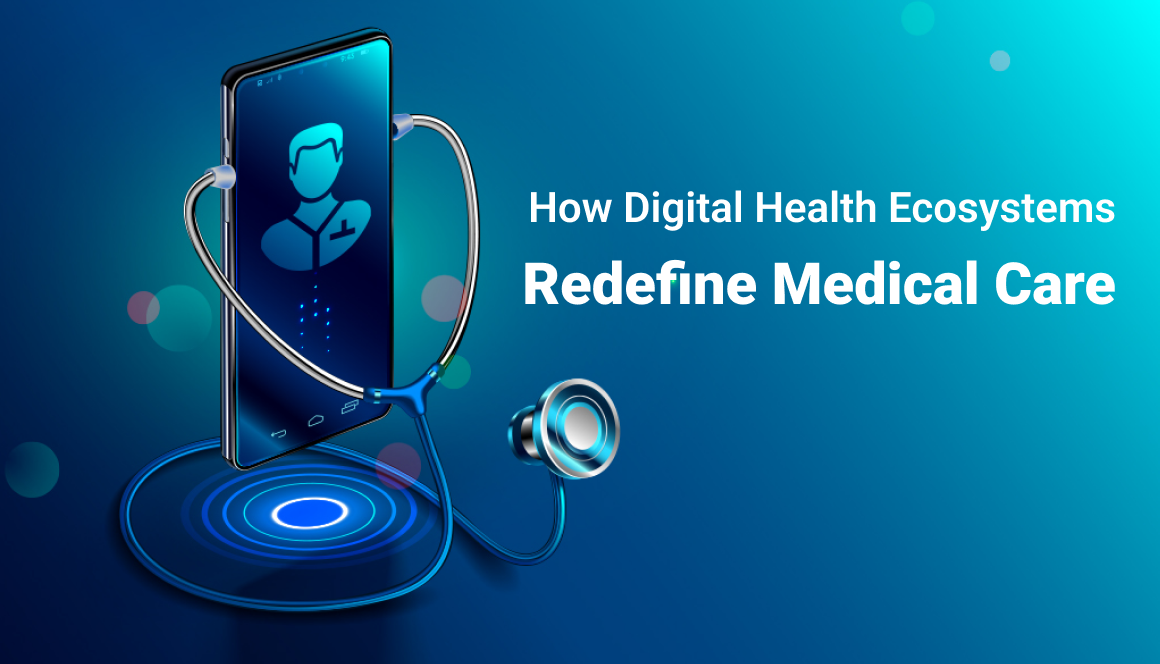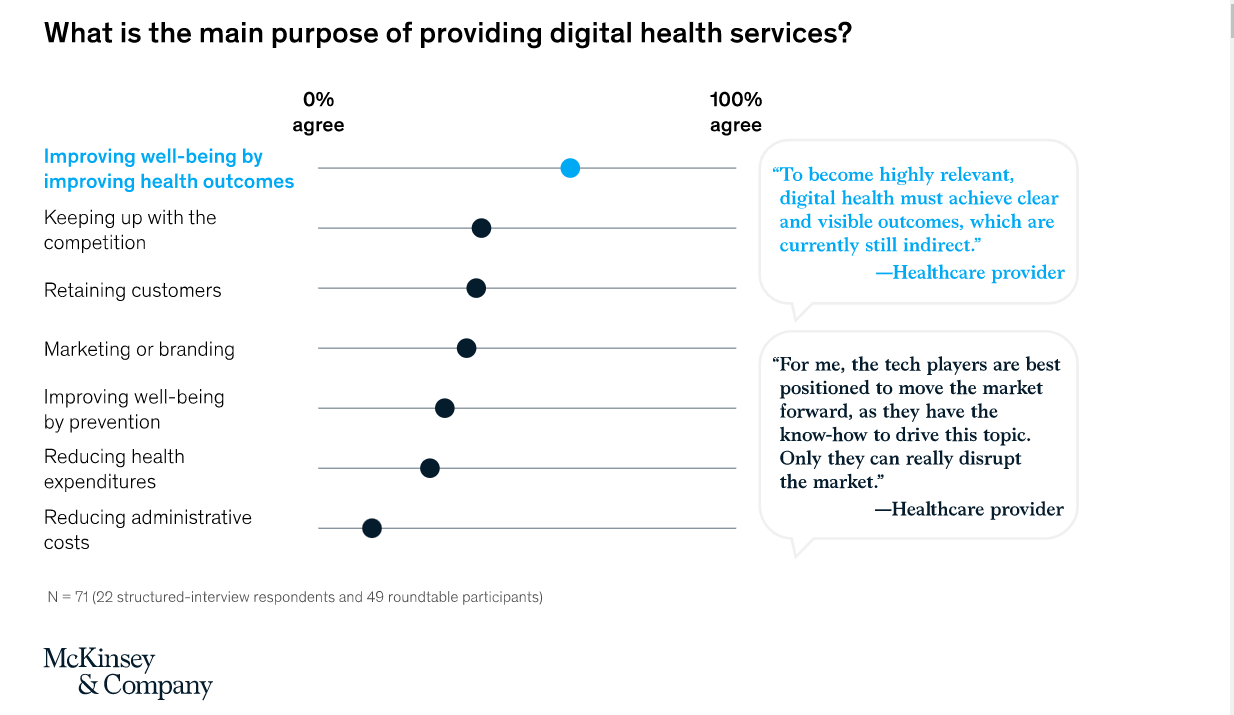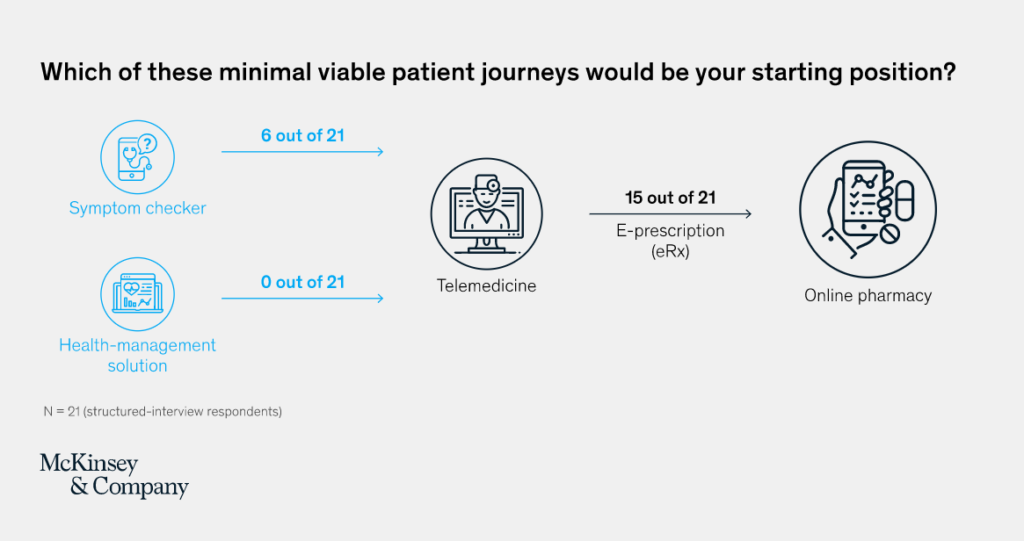
Here’s what you will learn:
Digital technology is transforming every sector. New capabilities are redefining the way we bank, travel and shop. In keeping with these trends, the healthcare industry, too, is undergoing dramatic transformations. And COVID-19 pandemic only accelerated what was already in progress. Digital transformation in healthcare is all about a patient-focused approach to healthcare. It assists healthcare institutions to streamline operations, learn about patient requirements, build loyalty, and offer a personalized user experience.
As a care provider, it is important for you to keep up with digital transformation services in healthcare. Selecting appropriate technology might be a challenging task. Familiarizing with the digital era means eliminating outdated business processes and ensuring that technological disruption will bring desired results.
Over 87% of executives agree that the healthcare industry and tech strategies they follow have already become inseparable, according to an Accenture report.
In this blog, we’ll discuss why digital technology is important for the health industry and its consumers. In doing so, we’ll also delve deeper into the technological trends should we expect in 2022.
Table of Contents
What Digital Transformation of Healthcare Means
As for the healthcare industry, digital transformation refers to the implementation of technologies, people, and processes to deliver more sustainable outcomes to patients and healthcare. In other words, it is all about making use of innovative approaches and the latest technologies to get the most benefits of the industry.
Nearly 92% of healthcare units have achieved improved performance from the patient-centric business development model, according to Deloitte.
It means improving the treatment quality and other services, accurate laboratory results, and advanced techniques to medicine selection to cure diseases.
Use Cases of Digital Healthcare Solutions
So, digital transformation makes a thorough analysis of how the medical staff diagnose, monitor, and manage patient health. The core objective is to implement advanced healthcare IT solutions to automate the workflow processes and compliances while reducing costs.
Let’s now learn how digital healthcare is already playing a crucial role in medicine.
1. On-Demand Healthcare Solutions
In the last few years, people have become more mobile, encouraging organizations to implement innovative technologies, particularly in the healthcare field. Professionals have collaborated with multiple medical facilities at a time.
It enables medical staff to provide “on-demand” services to the patients, as per their expertise, experience, and schedule. Thus, the demand for healthcare mobile app development companies has surged to create on-demand mobile app solutions.
2. Virtual Consultations
One of the most crucial changes observed in healthcare is the growth of virtual doctor consultations. It enables meeting the medical professionals from any location at the most convenient time, which is cost-efficient.
Based on the survey, around 83% of patients are using telemedicine, which has become more popular after the COVID-19 pandemic outbreak. Patients can schedule appointments, interact with doctors via video chats, receive detailed prescriptions, and more.
3. Health Wearables
People have become conscious about their health and always look for effective yet convenient means to track their health data. That was the core objective of why we’ve seen tremendous growth in the sales of wearable gadgets. The wearable mobile apps enable tracking the various health metrics and provide accurate health data including heart rate, calories burnt oxygen level, and blood sugar.
Top Benefits of Digital Transformation in Healthcare
-
End-to-end Connectivity
IoT helps to automate patient care workflow using healthcare mobility solutions and other innovative technologies. Innovative technologies enhance interoperability, machine-to-machine communication, information exchange, and data movement. The medical staff can customize the treatment when they identify illnesses and ailments in patients.
-
Timely Monitoring
Real-time monitoring is a life savior during heart failure, diabetes, and asthma attacks. Doing monitoring of the patient’s condition using medical devices, can easily gather health data and share it with the physician. The wearable device provides timely information including blood pressure, oxygen and blood sugar levels, weight, and ECGs.
3. Data Analysis
The large volume of patient-related information is difficult to store and manage if the availability of the cloud is not possible. Even for admin collecting data from different devices and sources manually is a challenging job. Devices analyze data in real-time and eliminate the troubles of storage. Digital transformation assists organizations to avail of crucial healthcare analytics and data-driven insights to make smart decisions.
Technology Trends for Healthcare Industry in 2022
-
Artificial Intelligence
AI has become a key part of the healthcare industry and its importance can’t be ignored. As healthcare users grow rapidly, AI is the perfect technology to identify unusual behaviors including fraud threats and find out malware. The technology helps patients to improve their living standards and have proper control of their health. This advanced technology is majorly used to build healthcare algorithms.
-
Blockchain
Blockchain securely generates complete transaction histories to eliminate any medical fraud. Its decentralized technique offers advanced security, as its data is unalterable. With the presence of a smart payment system, claims are settled without any delay. In addition, Blockchain Solutions offer timely access to digital form health records, leading to advanced patient treatment.
3. Virtual Reality
The technology was initially released for gamers and is now an essential part of healthcare solutions. Doctors are implementing VR technology to benefit memory lost patients recall their old memories like favorite vacation spots, street views, and childhood homes. Those experiences are essential for the patient engagement solutions comprising improvement of overall care. VR supports surgeons visualize potential obstacles before performing complex surgeries.
These are only a few of the major trends in digital healthcare. However, implementing them in medical enterprises can boost the complete industry performance!
Wrapping Up
Digital transformation is a continuous process, and latest trends come into implementation in the healthcare industry with each passing day. When considering digital transformation in healthcare, you must think beyond technology to drive innovation. You can select the technological trends from the above to deliver the best patient care.
FAQs
1. What is digital transformation?
Digital transformation is the use of digital technologies to reinvent the way healthcare institutions offer services, to be more productive, agile, and responsive, to deliver higher value at a lower cost.
2. What is the cost of Healthcare App Development?
The cost of creating a healthcare app depends on the multiple features and technologies needed. Only after the initial discussion and the client’s budget, the quote can be prepared.
3. How long does it take to build a Healthcare Mobile App?
We would be working on strict deadlines for achieving short-term goals. So, based on the needs, it would take about 2-3 weeks to complete the whole application.




